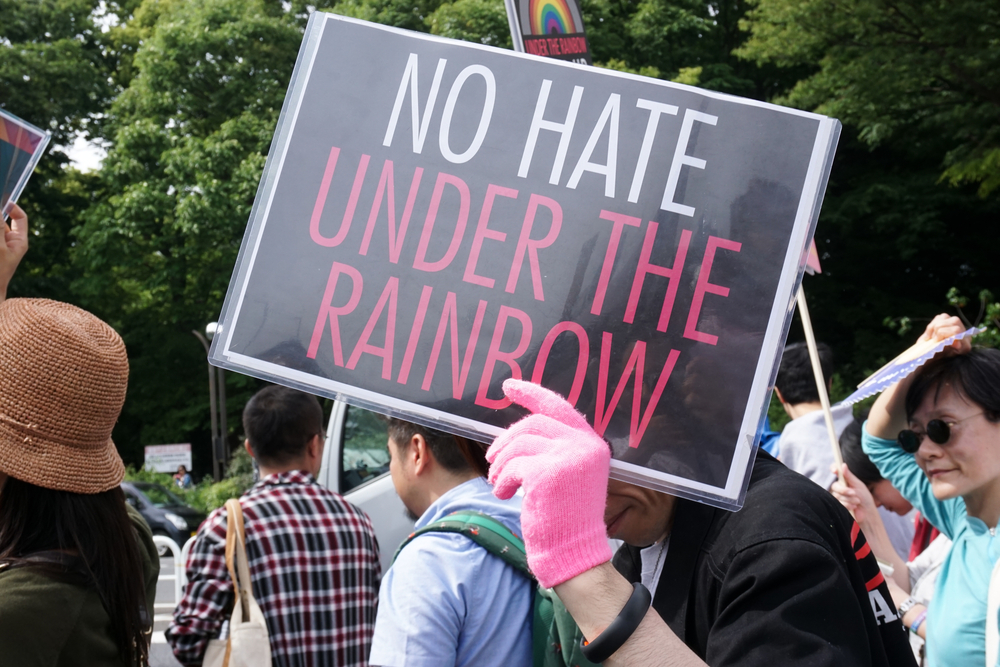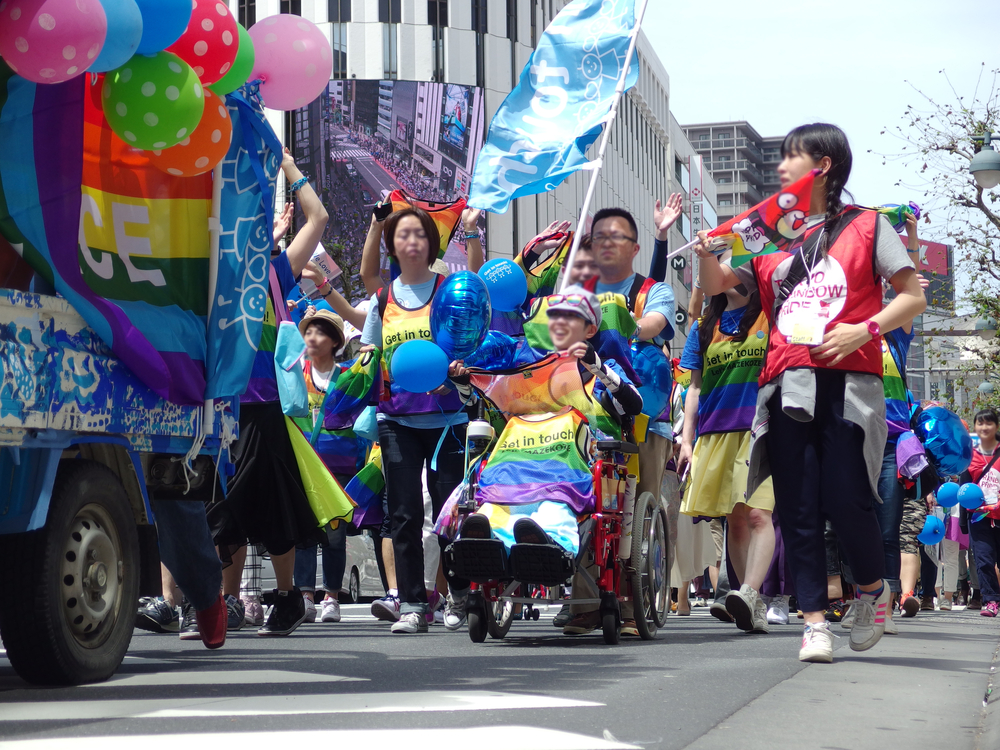Matches may be made in heaven but they must gain recognition on earth. Here in this corner of the world, some couples are waging an uphill battle to gain legal and societal rights that are routinely accorded to other pairs. Japan’s bi-national LGBTQ couples are living a life of uncertainty, denied the same rights that their heterosexual peers enjoy. This is despite the fact that Article 14 of Japan’s constitution clearly states, “All of the people are equal under the law and there shall be no discrimination in political, economic or social relations because of race, creed, sex, social status or family origin.”
Bi-National LGBTQ Couples Face Forced Separation
The Sapporo District Court recently ruled that Japan’s failure to recognize same-sex marriage is unconstitutional, a victory for advocates. However, progress still needs to be made, and for some it is coming too late. Jeff Shaw, 37, and Yuta Sasaki, 40, are a couple who face crippling uncertainty about their future. Shaw is a British National (Overseas) from Hong Kong, while his partner is Japanese. Four years ago they were married in the Embassy of the United Kingdom in Tokyo, according to Shaw.
“We went to the Immigration this year and tried to apply for special activity visa but it has been refused based on the ground that Japan currently [does] not recognize same-sex marriage,” says Shaw.
Shaw told us that he is on a business management visa in Japan, which runs out in June. Adding to the couple’s woes is Covid-19, which has put his visa renewal in jeopardy as the pandemic affected his waffle and coffee takeout shop.
If Shaw fails to renew his visa in June, the couple faces yet another peril because his Japanese husband is not eligible to stay with him in Hong Kong either.
We Are Not Treated the Same as Everyone Else
“If we were a heterosexual couple we could have got legal papers, status or spousal visa to stay in Japan,” said Kayin Fong, 53. Fong is a Canadian of Hong Kong-origin and Makiko Matsumoto, 52, is her Japanese partner. “Regardless of your sexual orientation, everyone should be eligible for a spousal visa in Japan,” said Fong. Daniel Yamada, 43 and Shota (full name withheld), 32, lived for more than seven years as a married couple in Berlin and Vienna. Daniel is from Austria, while his partner is Japanese. Life took a turn for Shota, who returned to Japan to look after his father after his mother passed away.
“Having not the right to have a spouse visa, it is the most discriminating situation I have ever been in my whole life,” says Yamada. “When we lived in Berlin and Vienna, Shota had all the rights. Unlimited staying-permission and work-permission. He was treated like any other Schengen-visa holder and had all the rights.”
Yamada points out that Japan is the only member of the G7 nations not to recognize same-sex marriage. “Taiwan can do it, so why not Japan?” he says.
The Law as It Stands Today
“In Japan, same-sex marriages are not recognized, and there is no national same-sex partnership system as there is in other countries,” said Makiko Terahara, a lawyer and representative director for the team at Marriage for All, a Chiba-based organization established by lawyers and others to achieve same-sex marriage. Marriage for All filed a lawsuit to that end in February 2019.
Terahara told TW that same-sex couples comprising of a Japanese national and a foreign national cannot marry in Japan in order to secure a spouse visa, and a foreign national spouse is unable to live in Japan in the first place if they cannot find a job or a place to study.
She adds that even if a foreign same-sex spouse of a Japanese national does obtain a visa that allows them to live in Japan, they are not considered a legal spouse of the Japanese partner and therefore cannot obtain the various legal and factual protections (e.g., inheritance, division of property, social security, etc.) that are normally granted to spouses. Yamada adds that same-sex couples are not allowed the same rights to rent a home or for such things as hospital visitations.
“We are simply strangers for the state institutions,” he says.
The Same-Sex Marriage Ball Is in The Court
In addition to the Sapporo District Court, Terahara says four district courts in Japan are currently in the process of directly questioning the constitutionality of the current lack of same-sex marriage. In a March 21 op-ed written for The Washington Post, Terahara wrote that “there is no doubt that the Sapporo ruling will have a positive impact on the other lawsuits.” Terahara told TW that another encouraging development was the granting of a special permit of residence to a Taiwanese national with a Japanese male partner in March 2019. The couple could only gain the permit after one of the men sued the government to halt the deportation of the foreign partner.
“The ‘special permission for residence’ is less stable than the spouse visa, but it is the first time in Japan that a foreign national’s same-sex partner has been granted residence status, so it was a breakthrough,” Terahara says.
Is Marriage Equality Coming in the Future?
Fong is hopeful for a solution to the hardships faced by LGBTQ residents of Japan. She says that Japanese society is “more receptive” toward the community whether they are couples or not, adding, “In terms of the legal system, [it] still sucks big time.”
Since Tokyo’s Shibuya ward began offering partnership certificates to same-sex couples in 2015, nearly 50 local governments in Japan have followed suit. Businesses and hospitals are asked to recognize the certificates, but they are not legally binding.
In late February, according to The Mainichi, a Tokyo-based, non-governmental organization launched a mobile phone application to issue partnership certificates to same-sex couples. The Famiee Project aims to provide benefits like life insurance and landowners’ permission to live together, which would ordinarily not be available to them. Forty companies including Japan Airlines Co. and Mizuho Financial Group have reportedly agreed to accept the blockchain-based certificate issued by the organization.
Pointing to the special permit of residence granted to the Taiwanese-Japanese couple, Terahara said it would be desirable for other same-sex couples to be granted special permission to stay in Japan as a general rule until same-sex marriage is recognized in Japan.
In the past, as reported by The Japan Times in 2015, the Immigration Services Agency has offered a “Designated Activities” residence status to foreigner-foreigner same-sex couples, but this status has not been extended to Japanese-foreigner same-sex couples. “Japan does recognize same-sex marriage if both [partners] are foreigners. But because one of us is Japanese and Japanese law does not recognize such marriage, a visa will not be granted,” says Shaw.
“We only want to be treated the same as everybody else.”
Our Voices, Our Rights
Tokyo Rainbow Pride, one of Asia’s largest LGBTQ events, celebrated its 10th anniversary in 2021 with a 12-day, online celebration following the theme, “Our voices, Our rights.” from April 24–May 5.
Find more info at: tokyorainbowpride.com












